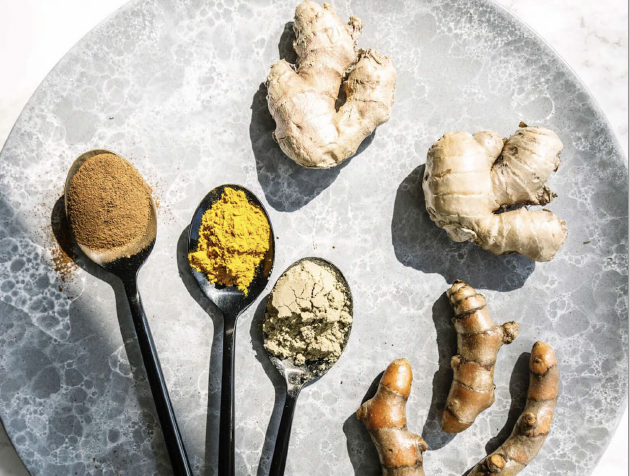The Truth About Inflammation
/Chronic inflammation has become a topic of increasing interest in the fields of health and wellness. Spices like turmeric and ginger, and modalities like infrared saunas have risen in popularity as people look for new ways to combat inflammation. Chronic inflammation is both a sign and symptom of numerous health conditions, like cardiovascular disease, diabetes, cancer, neurodegenerative disease, autoimmune diseases, digestive disorders, obesity, and more. It’s no wonder why people are concerned and trying to learn more about this! In this week’s blog post, I’m breaking down inflammation and giving you some tips on how to keep your own at bay.
Chronic vs. acute inflammation
When we say the word “inflammation” it’s usually in a negative context—but inflammation itself isn’t always bad. The best way I can describe inflammation is that it’s an immune response—it’s the result of our immune system kicking into action. If we get a virus or infection, for instance, the body is responding to that threat and we experience inflammation. The same goes for after a major surgery—we develop swelling and inflammation while the body works to heal and repair itself. These examples are what we call “acute inflammation”—meaning it’s situational, temporary, and responsive to a specific bodily affliction. Chronic inflammation, on the other hand, is considered more serious and problematic.
For otherwise healthy individuals (who don’t have a chronic illness or disease that results in inflammation), chronic inflammation can be triggered by certain lifestyle factors. In most cases this includes poor eating habits, environmental exposure, excessive stress, and sleep patterns. When we don’t take steps to live a healthy lifestyle, and we consistently make unhealthy choices, our bodies are in a state of constant distress, and that results in inflammation. The result? Our risk of life-threatening diseases increases and so does our physical and metabolic age.
So, what can you do about inflammation? What steps can you take to avoid it or lower it if you have it? Here are my recommendations based on what has worked for me and my clients:
Sleep. Sleep. Sleep!
Getting seven to nine hours of sleep (ideally eight) every single night is absolutely crucial if you want to lower your disease risk and inflammation levels. Recently I have been starting to wind down for bed around 9 pm, fall asleep by 10 pm, and wake up at 6 am. To help me form this habit, I got an alarm clock that simulates the sunrise in the morning and wakes me up with the calm sound of birds chirping. I love being able to plug my phone in the other room and not having the option to mindlessly scroll before bed, which has been shown to compromise sleep quality. For more tips on getting better sleep, check out my blog posts here and here.
Keep it moving!
As Dr. Keith Diaz, PhD, told me in our discussion about sitting, we have to keep our bodies moving regularly in order to stay healthy and happy. Getting up every hour and walking for at least one minute is the minimum we should strive for—ideally we should get up every 30 minutes and walk for five minutes, but that’s not doable for everyone, so do what you can.
Eat anti-inflammatory foods.
Turmeric and ginger aren’t the only foods that help ward off inflammation. Fatty fish like salmon, avocados, broccoli, leafy greens, garlic, onions, almonds, mushrooms, hemp seeds, tomatoes, really any vegetable…these are all considered anti-inflammatory foods (unless you have an allergy to them, in which case you should obviously not eat those). Green tea is also super anti-inflammatory.
Cut back on the booze.
You probably knew this one was coming…drinking is one of the worst things we can do for our health, if you really look at the science. Yea, yea, there is some evidence that red wine has some health benefits, but most people aren’t drinking to be healthy (and don’t drink in healthy amounts). Alcohol is inflammatory, and the more you can swap it out for water or another more health-forward beverage, the better. I’ve been getting into making mocktails that have loads of health benefits, plus they’re delicious! Try this Anti-Inflammatory Cantaloupe Mojito Mocktail, this Swirled Basil Blackberry Mocktail, or my favorite, this Relaxing Blackberry Chamomile Tea Mocktail For Better Sleep.
Protect your skin
Your skin is the largest organ on your body—treat it right! Wearing SPF daily, cleaning and moisturizing, the works! By shielding your skin from harmful UV rays and pollution, you are limiting the factors that can lead to inflammation in your body. Skin health is whole body health! For more tips on keeping your skin vibrant, you can check out my blog posts on skincare here and here.
Inflammation isn’t something you need to be scared of—but it’s something we should all keep in mind and take steps to avoid. I have a ton of articles related to inflammation, if you’re interested in learning more! Check out my post on turmeric here and my favorite Turmeric Golden Latte recipe here. I hope you’ll consider joining the Pure Joy Squad, where you’ll get unlimited access to all of my content, blog posts, recipes, new Mat Pilates classes every month, and so much more! Tap here to check it out!
Xo,
Renata

